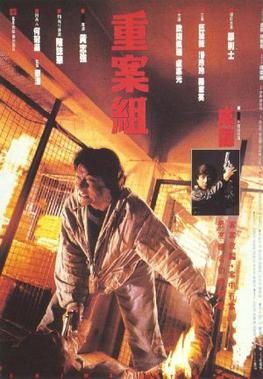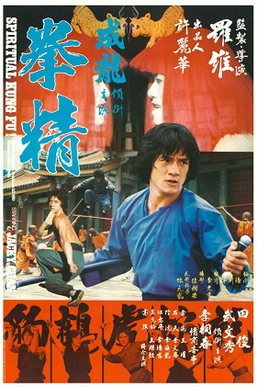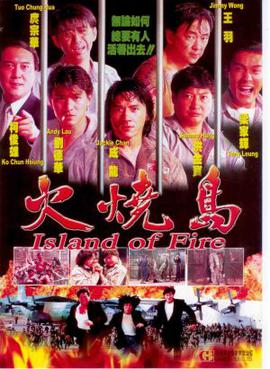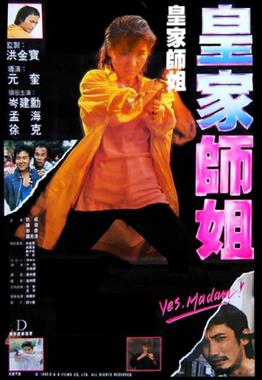
Fang Shilong, known professionally as Jackie Chan, is a Hong Kong actor, director, writer, producer, martial artist, and stuntman known for his slapstick - acrobatic fighting style, comic timing, and innovative stunts, which he typically performs himself. Before entering the film industry, he was one of the Seven Little Fortunes from the China Drama Academy at the Peking Opera School, where he studied acrobatics, martial arts, and acting. In a film career spanning more than sixty years, he has appeared in over 150 domestic and international movies. Chan is regarded as one of the most iconic and influential martial artists in the history of cinema.

Rumble in the Bronx is a 1995 American and Hong Kong action comedy film directed by Stanley Tong. The film stars Jackie Chan, Anita Mui, and Françoise Yip. The film was released theatrically in Hong Kong on 21 January 1995. Rumble in the Bronx had a successful worldwide theatrical run, and brought Chan into the North American mainstream. The film is set in the Bronx area of New York City, but was filmed in and around Vancouver, Canada.

Drunken Master, also known as Drunken Master The Beginning, is a 1978 Hong Kong martial arts comedy film directed by Yuen Woo-ping and produced and co-written by Ng See-yuen. The film features much of the same crew as Yuen's Snake in the Eagle's Shadow released earlier the same year, including lead actors Jackie Chan, Yuen Siu-tien, and Hwang Jang-lee; although narratively unrelated, Drunken Master bears similarities to its predecessor in its story and style.

Project A is a 1983 Hong Kong martial arts action comedy film starring and directed by Jackie Chan, who also wrote the screenplay with Edward Tang, who produced with Leonard Ho and Raymond Chow. The film co-stars Sammo Hung and Yuen Biao. Project A was released theatrically in Hong Kong on December 22, 1983.

The Medallion is a 2003 buddy action comedy film directed by Hong Kong film director Gordon Chan, who also wrote the screenplay with Bennett Joshua Davlin, Bey Logan, Paul Wheeler, and Alfred Cheung, who also produced.

Police Story is a 1985 Hong Kong action comedy film directed by and starring Jackie Chan, who co-wrote the screenplay with Edward Tang. It is the first film in the Police Story franchise. It features Chan as Hong Kong police detective "Kevin" Chan Ka-Kui, alongside Brigitte Lin and Maggie Cheung. In the film, Ka-Kui helps arrest a drug lord, but must clear his own name after being accused of murder.

Crime Story is a 1993 Hong Kong action crime thriller film, directed by Kirk Wong, and starring Jackie Chan, Kent Cheng, Law Kar-ying and Puishan Au-yeung. The film was released in Hong Kong on 24 June 1993.

Police Story 4: First Strike, also known as First Strike or Jackie Chan's First Strike, is a 1996 Hong Kong action comedy film directed and co-written by Stanley Tong, and starring Jackie Chan, Jackson Lou, Annie Wu, Bill Tung, Yuri Petrov, and Nonna Grishayeva. It is the fourth main installment of the Police Story series, and the final film in the series' original timeline before its reboot with 2004's New Police Story.

Police Story 2, also known marketed as Police Story Part 2 is a 1988 Hong Kong action comedy film starring and directed by Jackie Chan, who also wrote the screenplay with Edward Tang. It is a sequel to the hit 1985 film Police Story, continuing the storyline of Chan's character "Kevin" Chan Ka-kui, and is the second installment of Police Story series. It also marks the last appearance in the series for Lam Kwok-Hung as Chief Inspector Raymond Li, Chor Yuen as Chu Tao and Charlie Cho as John Ko.

Dragons Forever is a 1988 Hong Kong martial arts action comedy film directed by Sammo Hung, who also starred in the film, and co-directed by Corey Yuen. The film co-stars Jackie Chan, Yuen Biao, Pauline Yeung, Deannie Yip, Yuen Wah, Roy Chiao, and Crystal Kwok. It is the last film in which Hung, Chan and Biao all appeared in together, as later Chan subsequently focused on his solo film career.

Spiritual Kung Fu is a 1978 Hong Kong martial arts comedy film directed and produced by Lo Wei. The film stars Jackie Chan, James Tien, and Dean Shek. The film features Yuen Biao as one of the Master of the Five Fists martial arts, and Chan was also the film's stunt co-ordinator. The film was also known in some other dubbed language releases as Karate Ghostbuster.

Supercop 2 is a 1993 Hong Kong action film directed by Stanley Tong and starring Michelle Yeoh. It is a spin-off of Jackie Chan's Police Story film series involving the character Yeoh portrayed in Supercop.
![<i>Dragon Lord</i> 1982 [[Cinema of Hong Kong|Hong Kong]] film](https://upload.wikimedia.org/wikipedia/en/1/17/Dragon-Lord-poster.jpg)
Dragon Lord is a 1982 Hong Kong martial arts comedy film starring and directed by Jackie Chan, who also wrote the screenplay with Edward Tang and Barry Wong. It was originally supposed to be a sequel to The Young Master and even had the name Young Master in Love until it was changed to Dragon Lord. The film was experimented by Chan with various elaborate stunt action sequences in a period setting, serving as a transition between Chan's earlier kung fu comedy period films and his later stunt-oriented modern action films.

Island of Fire is a 1990 Taiwanese-Hong Kong action film directed by Kevin Chu, and starring Jackie Chan, Andy Lau, Sammo Hung, Tony Leung Ka-fai and Tou Chung-hua. The film was shot in Taiwan and the Philippines in 42 days from 5 April until 17 May 1989. The film's theme song, "The Last Gunshot" (最後一槍) by Cui Jian, was written as a response to the 1989 Tiananmen Square protests and massacre in Beijing, China.

City Hunter is a 1993 Hong Kong action comedy film written and directed by Wong Jing. The film stars Jackie Chan, Joey Wong, Kumiko Goto, Chingmy Yau, Gary Daniels, Leon Lai and Richard Norton. It is an adaptation of the Japanese manga of the same name by Tsukasa Hojo, first serialized in Weekly Shōnen Jump between 1985 and 1991.

Yes, Madam is a 1985 Hong Kong action film directed by Corey Yuen, and produced by Sammo Hung, who also appears in a cameo in the film. The film stars Michelle Yeoh as Senior Inspector Ng who teams up with Inspector Carrie Morris to get a hold of microfilm which has been taken unknowingly by low level thieves Asprin and Strepsil.
Hong Kong Legends was a United Kingdom DVD distribution company, based in Hertfordshire and operating from the UK and Australia between 1999 and 2007. Hong Kong Legends was initially part of Medusa Communications, who, along with Soulblade bought up the UK distribution rights for film titles previously owned by Eastern Heroes label.

Police Story is a Hong Kong action film series created by and starring Jackie Chan. It comprises seven films, variously directed by Jackie Chan, Stanley Tong, Benny Chan, and Ding Sheng, and produced by Raymond Chow, Leonard Ho, Jackie Chan, Barbie Tung, Willie Chan, Solon So and Yang Du. The first film Police Story was released on 14 December 1985. The film's success led to three sequels, one spin-off, and two reboots.
Mang Hoi was a Hong Kong actor and action director. He won the Best Supporting Actor at the 5th Hong Kong Film Awards for Yes, Madam. He is perhaps best known for his roles as Aspirin in the 1985 action film Yes, Madam, and Hoi in the 1986 action thriller film Legacy of Rage.

Detective vs Sleuths is a 2022 Hong Kong action thriller film directed, co-written and co-produced by Wai Ka-fai, starring Sean Lau, Charlene Choi, Raymond Lam and Carman Lee. The film follows a former police with a mental disorder (Lau), who works with an elite inspector (Choi) in a series of murders which are seemingly connected to past cases they've once inspected. They find themselves in a race against time to find out the truth and the mastermind behind these murders.













![<i>Dragon Lord</i> 1982 [[Cinema of Hong Kong|Hong Kong]] film](https://upload.wikimedia.org/wikipedia/en/1/17/Dragon-Lord-poster.jpg)




